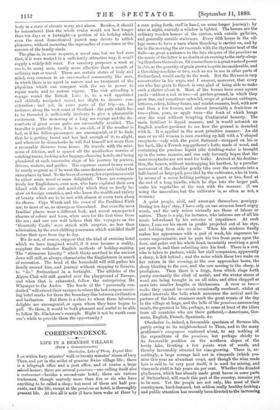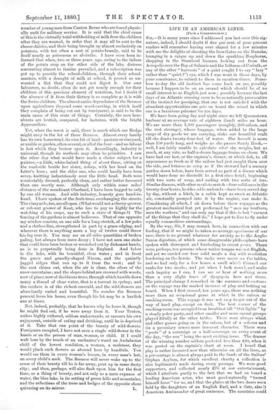CORRESPONDENCE.
LIFE IN A BERNESE VILLAGE.
[FROM • CORRESPONDENT.] Oberhofen, Lake of Than, August 31st. I AM within forty minutes' walk or twenty minutes' steam of busy Thun, and yet in the midst of genuine Swiss village life ; there is a telegraph office and a post office, and of course a large ashool-honse ; there are several pensions—one calling itself also a restaurant—besides a second-rate hotel; there are various tradesmen, though scarcely more than five or six who have anything to be called a shop; but most of them are half pea- sants, and the life, except at the pensions or hotel, is thoroughly peasant life. At five all is astir (I have been woke at three by a man going forth, staff in hand, on some longer journey); by nine at night, scarcely a window is lighted. The houses are the ordinary wooden houses of the canton, with outside galleries, and generally outside staircases. Every fifth house in the vil- lage seems to have a barn where threshing is carried on, and by six in the morning the air resounds with the rhythmic beat of the flails—as great a nuisance to the late sleapers of the pensions as the music of the latter is no doubt of an evening to the early-sleep- ug threshers themselves. Of course there is a great waste of power in Ns, as the quantity of grain grown is quite inconsiderable, and a threshing-machine or two, such as are in use in other parts of Switzerland, would easily do the work. But the Bernese is very conservative in his ways, and I suspect, moreover, that every one who has grain to thresh is very glad of being able to make such a clatter about it. Most of the houses have some square yards—seldom a rod or two—of garden-ground, in which they grow fine, and sometimes splendid, crops of potatoes, cabbages, lettuces, celery, kidney-beans, and scarlet-runners, beet, with now and then a few flowers, and almost invariably a fruit-tree or two—plum, pear, or apple trees—the fruit of which hangs over the road without tempting Continental honesty. The main fertiliser is liquid manure, and it would astonish an English market-gardener to see how the ground is drenched with it. It is applied in the most primitive manner. An old man or an old woman is seen crawling up-hill with a V-shaped receptacle—only with the point flattened—strapped on his or her back, like a French rag-gatherer's hotte, made of wood, and containing the precious liquid (the drinking-water is brought up in the same manner, and one only fervently hopes that the same receptacles are not used for both). Arrived at his destina- tion, the bearer, without unstrapping his burthen, by a peculiar movement of the shoulder gently tilts over the contents into a half-barrel or large pail, provided by the cultivator, who in turn, by means of a scoop holding perhaps a quart or two, fixed at the end of a long handle, which he dips into the larger pail, soaks his vegetables at the root with the manure. (I am using the masculine, but the cultivator is, as often as not, a woman.) A quiet people, civil, and amongst themselves gossippy. During ten days' stay, I have only on one occasion heard angry words, and the only noises virtually are those of labour or nature. There is a pig, for instance, who informs one of all his meals beforehand by his outcries of impatience. At such times, I can see his snout in profile projected out of his stye, and bobbing from side to side. When his mistress finally makes her appearance with a pail of wash, his eagerness be- comes ungovernable, and he puts his two front paws upon the door, and pokes out his whole head, invariably receiving a good pat upon it, and then subsiding into his food. There is a cow, who is taken to pasture, while her stall companion, apparently a sheep, is left behind ; and the noise which these two make on her return in the evening, as the cow approaches home, the sheep bleating to the cow, and the cow mooing to the sheep, is prodigious. Then there is a forge, from which rings forth pretty constantly the clink of metal; and the winter stores of wood are being brought in on all sides, and often chopped or sawn into smaller lengths or thicknesses. A crow or two— rooks they cannot be—croak occasionally overhead; whilst at stated intervals the bells which announce the arrival and de- parture of the lake steamers mark the great events of the day to the village at large, and the bells of the pensions announcing meals, the greatest in life, perhaps, to some at least of the idlers from all countries who are there gathered,—Americans, Ger- mans, English, French, Spaniards, (kc.
Oberhofen is, indeed, a favourable specimen of Bernese life, partly owing to its neighbourhood to Thun, and to the many gentlemen's campagnes scattered about, to say nothing of the expenditure of the pensions, but perhaps chiefly to its favourable position on the northern slopes of the lovely lake, fronting a few points west of south, and thereby favourably situated for vine-growing. There is, ac- cordingly, a large acreage laid out in vineyards (which pro- mise this year an abundant crop), and though the wine made here is said to be very poor itself, it is used for mixing, and vineyards yield in fair years six per cent. Whether the dreaded phylloxera, which has already made great havoc in some parts of Switzerland, will reach this part of the country, remains yet to be seen. Yet the people are not only, like most of their countrymen, hard-featured, but seldom really healthy-looking; and public attention has recently been directed to the increasing number of young men from Canton Berne who are found physic. ally unfit for military service. It is said that the chief cause of this is the virtually total withholding of milk from the children after they are weaned, in order that it may all be sent to the Cheese-dairies, and their being brought up almost exclusively on potatoes, with too often a zest of potato-brandy, said to be itself nearly as poisonous as absinthe. I have even been in- formed that when, two or three years ago, owing to the failure of the potato crop on the other side of the lake, distress amounting almost to famine prevailed, and a subscription was got up to provide the school-children,. through their school- masters, with a draught of milk at school, it proved so un- wonted a diet that they could not digest it. Our own labourers, no doubt, often do not get nearly enough for their children of this precious element of nutrition, but I doubt if the absence of it from their dietary is so complete p.s it is with the Swiss children. The almost entire dependence of the Bernese upon agriculture (beyond some wood-carving, in which itself they complain of being cut out by foreigners), is said to be the main cause of this state of things. Certainly, the men here- abouts are loutish, compared, for instance, with the bright Appenzellers.
Yet, when the worst is said, there is much which our Hodge might envy in the lot of these Beruese. Almost every family has its own homestead, its own bit of laud—pasture or vineyard, or arable or garden, often several, or all of the four—and no labour is lost which they bestow upon it. Accordingly, industry is universal, though its methods may often be primitive. I saw the other day what would have made a choice subject for a painter,—a little, white-haired thing of about three, sitting on the road-side beside her sister, asleep, with her head on the latter's knee ; and the elder one, who could hardly have been seven, knitting industriously over the little head. Both were comfortably dressed, perfectly clean, and rather better favoured than one mostly sees. Although only within some miles' 'distance of the mendicant Oberland, I have been begged to only by one old woman. And with industry, honesty goes hand-in- hand. I have spoken of the fruit-trees overhanging the streets. 'The vineyards, too, are all open. (What would not a cherry-grower, or cob-nut grower of Kent, who has to pay so highly for the watching of his crops, say to such a state of things P) The 1 cueing- of the gardens is almost ludicrous. That of one opposite my window consists, on one side for a long stretch, of a few poles and a clothes-line, strengthened in part by a grass edging, and wherever there is anything more a boy of twelve could throw this leg over it. You may see on all sides quantities of broken paling, but always from mere decay ; I have not seen one stake that could have been broken or wrenched out by dishonest hands, as is so perpetually being done in England. And below is the lake, with its beautiful, clear water ; and in front -the green and grandly-shaped Niesen, and the quaintly jagged ridges that run up .to it from the west ; and to the east shines out, when the air is clear, the silver of the snow-mountains ; and the slopes behind are crowned with woods, now of pines, now of deciduous trees, through which tumble down many a thread of clear water, that is a torrent in spring ; and the verdure is of the richest emerald, and the wild-flowers are abundantly varied and beautiful. No wonder the Bernese peasant loves his home, even though his lot may be a bardish *ne at times.
Not, indeed, probably, that he knows why he loves it, though lie might find out, if he were away from it. Your Teuton, unless highly cultured, seldom understands, or savours his own enjoyment, outside of eating and drinking, until he is deprived of it. Take that one point of the beauty of wild-flowers. Foreigners excepted, I have not seen a single wild-flower in the hands or on the person of man, woman, or child. If I could waft here by the touch of an enchanter's wand an Andalusian child of the lowest condition, a woman, a muleteer, they would pluck such flowers as abound here by handfuls. You would see them in every woman's bosom, in every man's hat, on every child's neck. The Bernese will never wake up to the sense of their beauty till he is far away, pent up in some dusty city ; and then, perhaps, will also flash upon him for the first time, as a thing of beauty, and not only as a mere expanse of water, the blue lake, in its setting of green hills and mountains, and the reflections of the trees and hedges of the opposite shore



































 Previous page
Previous page